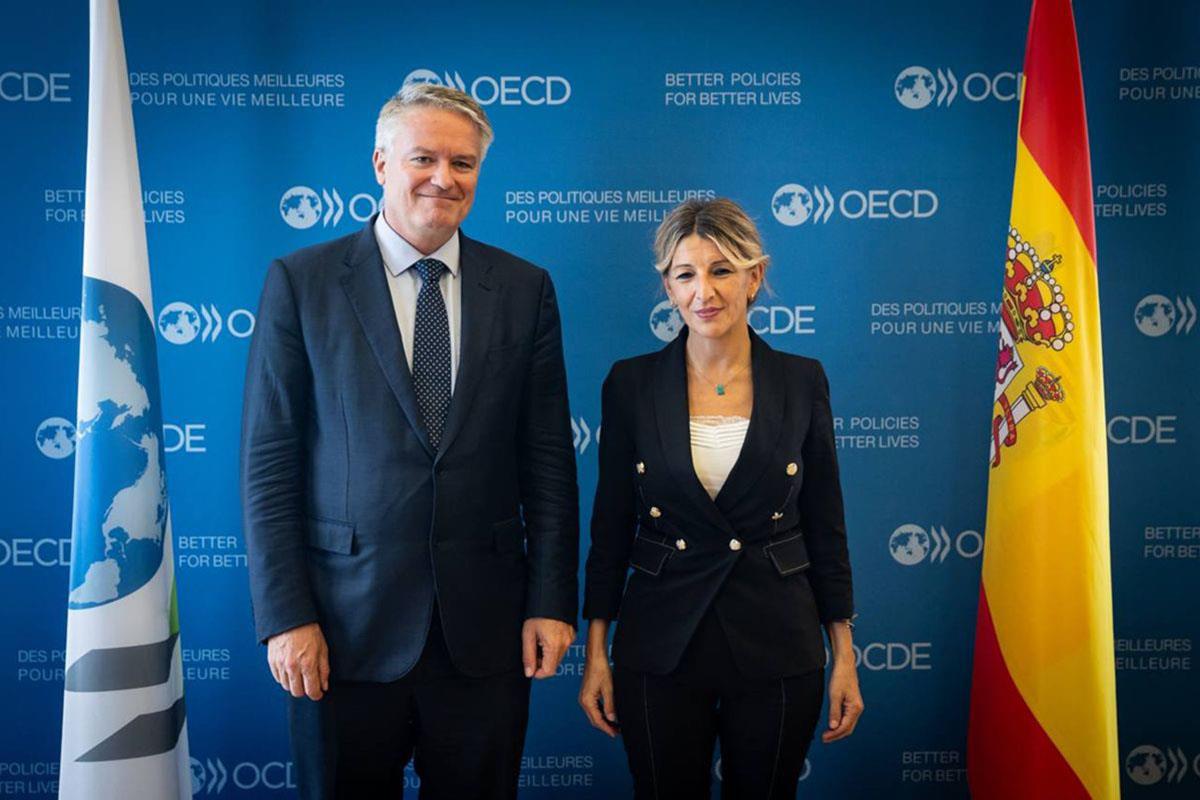At the presentation of the OECD's Productivity Report
Yolanda Díaz: "We have improved productivity sharing and reduced inequality"
News - 2024.6.5
 The Secretary General of the OECD, Mathias Cormann, with the Second Vice-President and Minister for Work and Social Economy, Yolanda Díaz, at the headquarters of the Organization for Economic Cooperation and Development in Paris
The Secretary General of the OECD, Mathias Cormann, with the Second Vice-President and Minister for Work and Social Economy, Yolanda Díaz, at the headquarters of the Organization for Economic Cooperation and Development in Paris
Accompanied by the Secretary General of the OECD, Mathias Cormann, and the OECD's Director of Labour, Employment and Social Affairs, Stefano Scarpetta, the minister explained that the report highlights that the measures implemented in recent years, especially the labour reform and the sustained increase in the Minimum Interprofessional Wage (SMI), have contributed to improving the distribution of productivity and reducing inequality.
Report endorses ministry's labour policy
The policies put in place by the Government of Spain and the Ministry of Work and Social Economy "have had and will continue to have a positive impact on the distribution of productivity gains. They are aimed at protecting employment and improving its quality, increasing wages and reducing job insecurity", insisted the vice-president, who also made the point that all of this has been achieved with record employment figures in the country.
The report concludes that the increase in the minimum wage, the decrease in the excessive use of temporary contracts and the mechanisms to support the maintenance of employment are reactivating productivity in the country, after several decades of stagnation. "We have transformed the labour paradigm to change the growth model and we are incentivising productivity and job quality rather than low wages and precariousness, as was the case until a few years ago," the vice-president pointed out.
Support for the introduction of shorter working hours
The report also notes as a positive measure the reduction of working time in the interests of greater welfare, as is currently being negotiated at the social dialogue table with trade unions and employers' organisations. Reducing working hours without reducing wages "is the most important measure we are going to implement this term of office", insisted the vice-president, who explained that both scientific evidence and international examples indicate that reducing working time has positive effects on productivity, since in general worker productivity decreases when working hours are increased.
Another important aspect when assessing productivity is to analyse the impact of technological innovations such as robotisation and artificial intelligence. In the minister's view, proper governance of these technological changes will not only guarantee the rights of working people, but will also promote "the sharing of profits to prevent digital monopolies from taking everything".
With this goal in mind, we worked to guarantee the rights of workers on the platforms at both Spanish and European level by recognising their labour rights and ensuring the transparent use of algorithms. In Spain "we are demonstrating that it is possible to increase workers' rights while increasing employment, without affecting productivity", said Díaz. "Our challenge in this area is to demonstrate that these measures will also serve to continue increasing productivity in the medium term", concluded the vice-president, who before presenting the report held a meeting with the Secretary General of the OECD, Mathias Cormann, with whom she discussed social and labour policies in the national and European contexts.
Implementing the recommendations
The paper concludes with a series of recommendations aimed at improving employment policies in the areas of minimum wages, working time, employment protection and active labour market policies, among others. "Many of these recommendations are already being implemented in our country," said Díaz.
Non official translation






